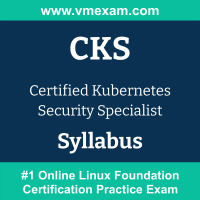 The Linux Foundation CKS exam preparation guide is designed to provide candidates with necessary information about the Kubernetes Security Specialist exam. It includes exam summary, sample questions, practice test, objectives and ways to interpret the exam objectives to enable candidates to assess the types of questions-answers that may be asked during the Certified Kubernetes Security Specialist (CKS) exam.
The Linux Foundation CKS exam preparation guide is designed to provide candidates with necessary information about the Kubernetes Security Specialist exam. It includes exam summary, sample questions, practice test, objectives and ways to interpret the exam objectives to enable candidates to assess the types of questions-answers that may be asked during the Certified Kubernetes Security Specialist (CKS) exam.
It is recommended for all the candidates to refer the CKS objectives and sample questions provided in this preparation guide. The Linux Foundation Kubernetes Security Specialist certification is mainly targeted to the candidates who want to build their career in Cloud & Containers domain and demonstrate their expertise. We suggest you to use practice exam listed in this cert guide to get used to with exam environment and identify the knowledge areas where you need more work prior to taking the actual Certified Kubernetes Security Specialist exam.
Linux Foundation CKS Exam Summary:
| Exam Name | Certified Kubernetes Security Specialist |
| Exam Code | CKS |
| Exam Price | $445 USD |
| Duration | 120 minutes |
| Number of Questions | 15-20 |
| Passing Score | 67% |
| Recommended Training / Books | Kubernetes Security Essentials (LFS260) |
| Schedule Exam | Linux Foundation |
| Sample Questions | Linux Foundation CKS Sample Questions |
| Recommended Practice | Certified Kubernetes Security Specialist (CKS) Practice Test |
Linux Foundation Kubernetes Security Specialist Syllabus:
| Section | Objectives | Weight |
|---|---|---|
| Cluster Setup |
- Use Network security policies to restrict cluster level access - Use CIS benchmark to review the security configuration of Kubernetes components (etcd, kubelet, kubedns, kubeapi) - Properly set up Ingress with TLS - Protect node metadata and endpoints - Verify platform binaries before deploying |
15% |
| Cluster Hardening |
- Use Role Based Access Controls to minimize exposure - Exercise caution in using service accounts e.g. disable defaults, minimize permissions on newly created ones - Restrict access to Kubernetes API - Upgrade Kubernetes to avoid vulnerabilities |
15% |
| System Hardening |
- Minimize host OS footprint (reduce attack surface) - Using least-privilege identity and access management - Minimize external access to the network - Appropriately use kernel hardening tools such as AppArmor, seccomp |
10% |
| Minimize Microservice Vulnerabilities |
- Use appropriate pod security standards - Manage Kubernetes secrets - Understand and implement isolation techniques (multi-tenancy, sandboxed containers, etc.) - Implement Pod-to-Pod encryption using Cilium |
20% |
| Supply Chain Security |
- Minimize base image footprint - Understand your supply chain (e.g. SBOM, CI/CD, artifact repositories) - Secure your supply chain (permitted registries, sign and validate artifacts, etc.) - Perform static analysis of user workloads and container images (e.g. Kubesec, KubeLinter) |
20% |
| Monitoring, Logging and Runtime Security |
- Perform behavioral analytics to detect malicious activities - Detect threats within physical infrastructure, apps, networks, data, users and workloads - Investigate and identify phases of attack and bad actors within the environment - Ensure immutability of containers at runtime - Use Kubernetes audit logs to monitor access |
20% |
